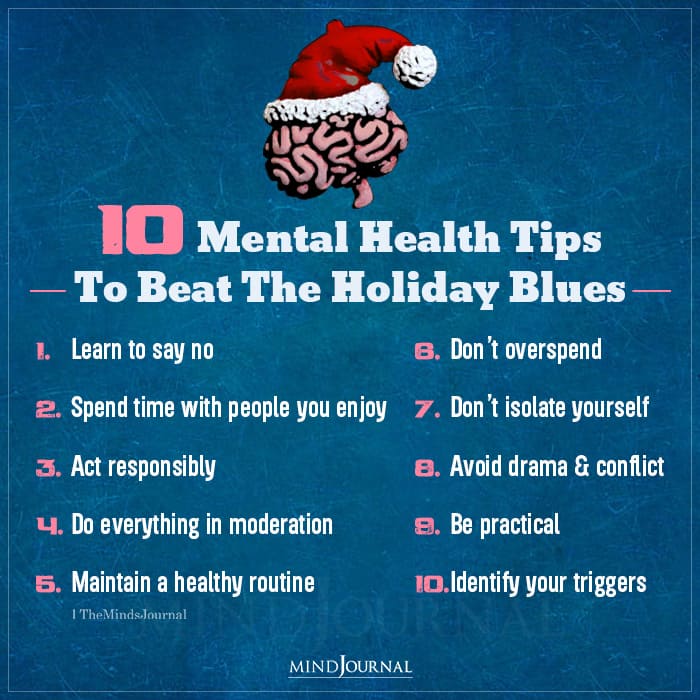The holiday season can be really stressful to deal with at times, which is why it is very important to prioritise and practice self care during the holidays. Holiday self care is not just important, it’s essential. So, how to practice self care during the holidays? Let’s find out!
KEY POINTS
- According to one study, 38% of people say the holidays cause more stress, depression, and anxiety.
- Sleep is important because the brain needs it to function effectively, efficiently, and productively.
- Before overextending oneself, it is best to be aware that the effort may not result in the reactions that one hoped for.
The holiday season can be an exciting time, but it can also be incredibly stressful for many people—especially when we ignore or marginalize our self-care.
According to the American Psychological Association, 38% of people surveyed said their stress increased during the holiday season, which can lead to physical illness, depression, anxiety, and substance misuse. The reasons given were lack of time, financial pressure, gift-giving, and family gatherings.
When we forget to focus on self care during the holidays, a Pandora’s box of mental health issues can arise, such as a negative attitude, physical exhaustion, resentment among family members, and physical symptoms of burnout.
In another survey by the National Alliance on Mental Illness (NAMI) 68% of survey participants felt financially strained, 66% experienced loneliness, and 63% felt an overwhelming sense of pressure.
Self-care can help mitigate most of these problematic issues. Here are six effective techniques that you can implement to make this holiday season more enjoyable and satisfying.
Related: Mental Health and Holidays: How to Safeguard Your Mental Health Amidst Holiday Hustle And Bustle
How Prioritizing Self Care During The Holidays Can Make You Feel Better
1. Practice mindfulness.
Try not to let freneticism interfere with your ability to make your holiday season enjoyable. Whether it’s holiday music, decorations, or the fir trees, take time to stop and notice.
Try to focus on those aspects mindfully. To make the season feel more special, think about what excites and makes you love the holidays.

2. Sleep.
Our brains need sleep to function effectively, efficiently, and productively. Make sure you don’t forget the critical importance of sleep. Poor sleep also negatively impacts our mood and interactions with others.
Maybe you’re telling yourself that there’s no time for sleep, but functionality decreases with less sleep. If you make getting the right amount of sleep a priority, you’ll feel surprised that you’ll get the same amount done, but with less negative interpersonal, physical, and mood impact.
3. Set boundaries.
When you set a holiday boundary, you’re doing it because of how you felt the prior year. The boundary is a way to rescue yourself from that same feeling. However, that doesn’t mean that people around you will not challenge the boundaries you set.
If you decide to bake 5 trays of cookies instead of 10 or set up 1 tree instead of 2, stick to it, despite any cajoling you get from other people. Saying “no” to them is saying “yes” to yourself.
Related: 24 Simple Self-Care Ideas For The Holidays and Beyond
4. Delegate.
The highlight of the holiday season for most people is sharing time with their family and loved ones, which can even include enjoying all the preparation.
You may feel it’s easier to do everything yourself, but don’t be afraid to delegate tasks to other people. If you set a precedent of including others, you create shared experiences. This will yield a greater sense of collective joy.
5. Take “you” time.
Ask yourself if you wish someone would do something nice for you or wish you had time to do something nice for yourself. Meditate on that question. Realize that if you don’t value yourself as much as everyone else around you, resentment will build.
So, don’t wait for someone else, take that walk, get that massage, or go to that movie. When you take care of “you,” your mood and efficiency will noticeably improve.

6. Don’t overextend.
It’s quite common for us we push ourselves to make the holiday season extremely nice for our families—while hoping they’ll notice the enormous efforts that we made to please them. You could decorate the house, bake their favourite foods, or purchase their wish gifts.
We may even fantasize about their reactions, which may fall short of our expectations. That can lead to resentment and zap our enthusiasm. Stay mindful of the efforts that you’re putting in, asking yourself if you’re comfortable overextending, with the awareness that you may not get the reactions you’re hoping for.
Related: Mental Health And Christmas: 6 Strategies For Preserving Your Peace Of Mind At Christmas
If you commit to implementing these strategies in advance, you’ll hopefully experience less resentment and stress, as well as increased levels of satisfaction, joy, and appreciation this holiday season.
References:
Admin, "Raising Mental Health Awareness During the Holiday Season," (2021) Discovery Mood & Anxiety Program "McLean's Guide To Managing Mental Health Around the Holidays, (December 22, 2021), McLean Hospital
Written By Jennifer Guttman Psy.D. Originally Appeared On Psychology Today










Leave a Reply